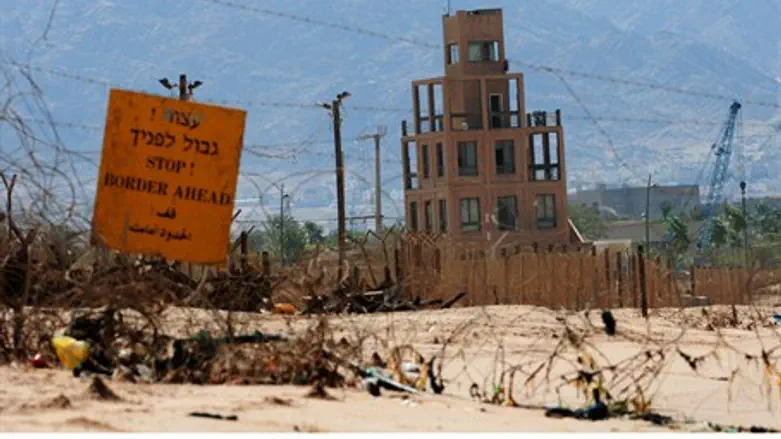
The Security Cabinet on Sunday adopted Prime Minister Binyamin Netanyahu's proposal to build a 30-kilometer (over 18-mile) long security barrier on the eastern border with Jordan in the very south of Israel.
The fence, which is to stretch from the southern port city of Eilat to the site designated for the Timna airport, comes after Israel completed work on the border fence with Sinai and improved the security barrier with Syria on the Golan Heights.
In addition the Security Cabinet approved the allocation of resources for building the fence.
Tensions have been high between Israel and Jordan, after the latter has threatened to revoke the 1994 peace treaty on several occasions recently to pressure Israel to allow the Jordanian Waqf to continue denying Jews their rights to pray at the Temple Mount.
Perhaps responding to those tensions, the Israeli government clarified in a statement that it has been in contact with the Jordanian government about the security fence, noting it won't infringe on Jordan's national interests.
At the start of a meeting of the Knesset Foreign Affairs and Defense Committee on Monday, Netanyahu referred to the Cabinet decision.
"Yesterday in the Security Cabinet, we made a very important decision to continue a section of fence along our southern border, this time from Eilat, 30 kilometers north to past the Timna airport that is under construction," explained the prime minister. "This is important. It is part of our national security."
"It joins the fence that we built along the length of our border with Sinai, which blocked the entry of illegal migrants into Israel and – of course – the various terrorist movements. This step also joins the fence that we built on our border on the Golan Heights."
Speaking about possible complications with Jordan, Netanyahu said, "I would like to make it clear that this fence will be entirely within the territory of the State of Israel. It will not, in any way, infringe on the sovereignty of the Hashemite Kingdom of Jordan and its national interests."
Peaceful neighbors?
Tensions have been openly sour between Israel and Jordan of late; Jordanian Ambassador to Israel Walid Obeidat was recalled to Jordan last November until February in an act of protest over talk in Israel of allowing Jews to pray on the Mount, which is the holiest site in Judaism but remains under the discriminatory de facto control of the Waqf.
Last November the Jordanian parliament held a special prayer session for the two Arab terrorists who committed a brutal attack on a Jerusalem synagogue, murdering four Jews at prayer and beheading two of them, as well as murdering a police officer.
Jordan's Prime Minister Abdullah Nsur also sent a letter of condolence to the families of the two murderous terrorists. Aside from its threats regarding the Temple Mount, Jordan also has been leading the Palestinian Authority's (PA) "diplomatic war" against Israel at the UN.
Jordan itself is made up of a majority of Palestinian Arabs, and nearly all Arab residents of Judea and Samaria hold Jordanian citizenship, leading many to suggest creating a "Palestine" in Jordan.
That suggestion has been given further backing by none other than PA Chairman Mahmoud Abbas, who said earlier this month that Jordanian and Palestinian Arabs are "one people living in two states."